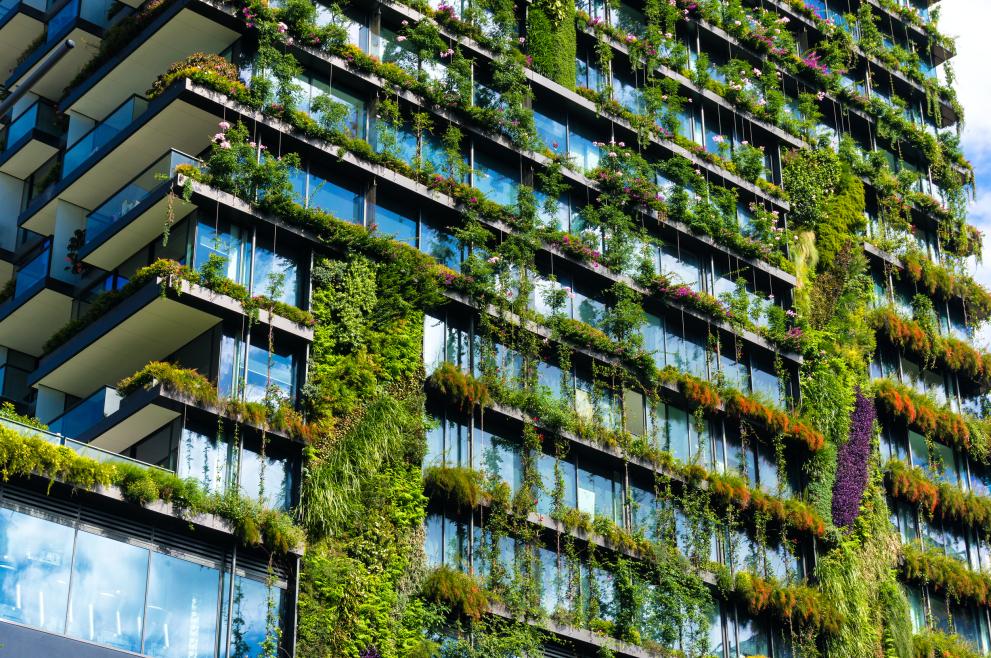
100 climate neutral and smart cities by 2030
Developing and implementing solutions for sustainable urban living is a key priority for the European Union. Cities take up only 4% of the EU’s land area, but they are home to 75% of EU citizens. In addition, cities are responsible for more than 70% of global CO2 emissions. Urban greening initiatives are urgently needed. To support the European Green Deal, the EU has created the Mission Climate-Neutral and Smart Cities. The Mission works to deliver 100 climate-neutral and smart cities by 2030. These cities act as experimentation and innovation hubs to inspire all European cities to follow suit by 2050. The EU works closely with stakeholders, including local authorities, citizens, businesses, investors and regional and national authorities to achieve this comprehensive urban transformation.
Urban transition with the help of nature
To render cities sustainable and resilient to climate change, many urban planners rely on nature-based solutions (NBS). These solutions, as defined by the European Commission, “bring more, and more diverse, nature and natural features and processes into cities, landscapes and seascapes, through locally adapted, resource-efficient and systemic interventions.” Some EU-funded projects, managed by the European Research Executive Agency, shared their work with NBS at the World Urban Forum, which took place in Katowice, Poland, on 26 – 30 June 2022.
Post-industrial urban regeneration
The project proGIreg explores NBS in the cities Dortmund, Turin, Zagreb and Ningbo. The post-industrial period has caused a series of challenges for these cities: lack of green spaces, social and economic disadvantages, inequality and related crime and security problems. At the World Urban Forum, officer at ICLEI Europe, Luca Costantino shared that “all cities want to relaunch their future and to experiment with nature-based solutions.” With so-called Living Labs, the project develops, tests and implements NBS such as pollinator biodiversity, green corridors, community-based urban farms and gardens, and regenerated soil.
Urban reforestation
The project CLEARING HOUSE investigates the potential of urban forests as nature-based solutions. Trees and forests can contribute to sustainable urban development by delivering ecosystem services, enhancing biodiversity and contributing to the wellbeing of urban societies. They bring shade, mitigate temperature, rainfall and wind, and provide food and fodder for animals. The project works with ten case studies in Europe and China. CLEARING HOUSE seeks to assist city planners, business and civil society in reaching the full potential of growing and caring for urban forests.
Urban resilience to climate change
UNALAB works to enhance the climate and water resilience of cities spread across the globe. The diversity of participating cities – regarding their sizes, socio-economic and political realities and climates – allow UNALAB to test and attune NBS to many different urban contexts. Yuhong Wang, from the Hong Kong Polytechnic University, at the World Urban Forum described the process of urban river restoration in Hong Kong. It was key “to use nature as a benchmark, to see how we can learn from the natural river (…) to restore future rivers in the urban environment.” UNALAB has already created a special NBS toolkit and a technical handbook for cities to consult.
Knowledge networks and policy making
CLEVER Cities develops and tests NBS in Hamburg, Milan and London to subsequently address urban challenges and promote social inclusion in cities across Europe, South America and China. CLEVER Cities offers learning platforms and training opportunities to share best practices and debate challenges with cities, project partners and thematic experts. By improving knowledge and experience with NBS, the project seeks to contribute data and information to EU policy-making.
Sustainable urban future
At the World Urban Forum, presenters and participants agreed that urban transformation should be treated with highest urgency. The EU is committed to deliver this action and works determinedly to create a sustainable, green urban future.
Useful links
100 climate-neutral and smart cities by 2030
Some EU-funded projects on nature-based solutions managed by REA (visual)
Details
- Publication date
- 26 July 2022
- Author
- European Research Executive Agency
